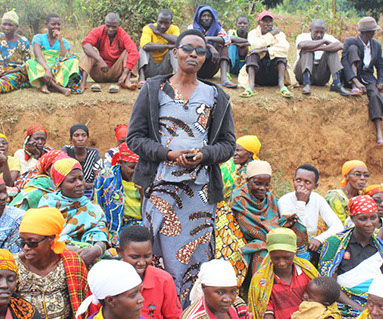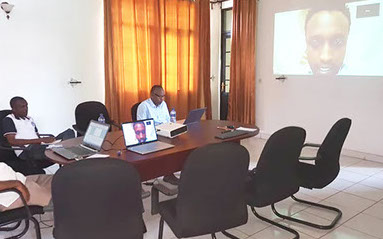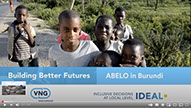Annual Update 2021 VNG International

Women participating in local planning meetings at the General Assembly at colline level (Commune de Gitanga, Colline Kazeba) February 2020

Training of Trainers session, ABELO, VNG International and The Hague Academy for Local Governance. May 2020
‘My post is not often filled by a woman. We are a conservative commune, and I am surrounded by men. I tried to change the system from within. I have started combatting the corruption in our commune, which had implications on not only my safety and security, but also that of my husband and family.’
Ms. Sylvie Nizigama,
administrator of the Municipality
of Rugazi
‘For me, the adaptability of ABELO, its master trainers and VNG International to online learning was impressive. The travel restrictions provided an opportunity to strengthen further the capacity of the master trainers and to give them more responsibilities; they were challenged and proved how empowered they have become. This has contributed to sustaining knowledge and skills within ABELO. I look forward to building on this success and, if possible, to see my colleagues face to face.’
Mr. Freddy Sahinguvu,
The Hague Academy for Local Governance
improving Access to Basic Services
by strengthening democratic local government
Featured Project
Burundi, IDEAL Country Programme
Since 2017, VNG International, IDEAL Burundi has supported the production of local development plans (PCDC) in Burundi, together with our main partner, the Burundi association of communes (ABELO).
VNG International has worked together with officials in the central government (ministry of communal development) and with eight project ‘communes’ in the south of the country. We support them in organising the dialogue with citizens and we facilitate the interaction between the communes and the central government on the one hand and the communes and the ‘collines’ (lower level local governments) on the other hand.
Results achieved:
- The outbreak of the Covid-19 pandemic in March coincided with the organisation of the National Day of the Municipalities. VNG International and ABELO collaborated with the Ministry of Health to provide adequate instructions to the participants of the 119 municipalities on how to prevent spreading the disease, as well as instructing them on how to use this knowledge in their own respective municipalities.
- Through a forum in Gitega the administrators of the communes got communication tools to promote that government measures are respected in public spaces and buildings.
- Together with The Hague Academy for Local Governance we conducted an online training for four "master trainers" within ABELO who in turn would train local government staff in all 119 communes in Burundi on local inclusive and gender-sensitive governance. The new technologies that we used for exchanging online in an active manner, can be used to re-watch recordings of the training, train others, and share them with the local governments as well.
- Following the electoral cycle in Burundi, VNG International set up a training for the new administrators of all 119 communes. The newly developed ‘Practical Guide for Locally Elected Leaders on the mandate of local governance’ helped to combine formal knowledge on the tasks and duties of a local politician with practical lessons learned from the eight IDEAL pilot communes on how to improve local government processes in terms of inclusiveness, conflict-sensitivity and responsiveness to local needs.
- The guide was validated by the inspectors for communal finance, the administrators and the provincial governors, and approved by the minister of Interior and Communal Development.
- In December 2020 a reflection workshop was organized on gender-based violence, for the newly-elected female administrators (2020-2025) and their husbands, and a group of female administrators from the previous mandate (2015-2020) to share their experiences. Participants identified several barriers to the effectiveness of female administrators in Burundi, such as persisting traditional views on marriage and on gender roles in society and in the household, but also the fragile context of Burundi in which security is difficult to guarantee.
